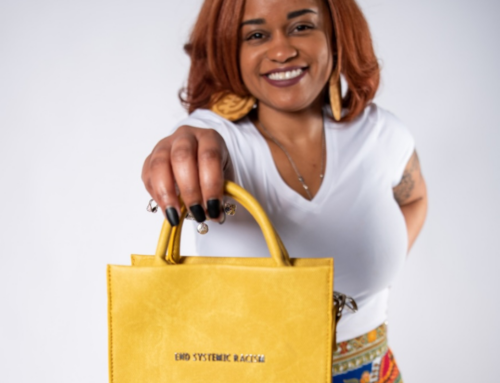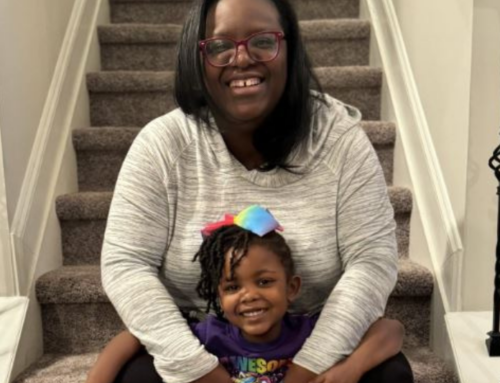Splitting her time between the National Training and Technical Assistance Center for Child, Youth, and Family Mental Health (NTTAC) and the Home Visiting-Technical Assistance Resource Center, newly hired Change Specialist Evelyn Clark has been busier than ever. In her role, she offers technical assistance and uses her background in peer mentoring and adaptive leadership along with experience in behavioral health to serve clients. But it’s more than her years of practice that qualify her to do this work—Evelyn brings valuable lived experience to the job.
“I actually got into this field because I was incarcerated as a young person,” she said. “Growing up where I grew up, I was around gang violence and in a home where there was a lot of domestic violence and abuses of all kinds. So, at 12, how I dealt with all of the stuff I endured, all the trauma and abuse, I got into the streets.”
Today, she is confident that her firsthand experience with juvenile justice and mental health systems gives her unique insight in her work, and she can truly comment on the efficacy of programs designed to help youth with backgrounds like her own. That’s also why she’s eager to share her story, because she’s making change from within.
“I just want people to know that you can go through what you go through and choose a path that can bring you so much joy and hope for yourself,” she said.
Entering Systems and Applying Lived Experience
Evelyn was just 12 years old when she was incarcerated for the first time, and that began a cycle of stints in and out of juvenile detention for the next five years. However, it was during one of these instances at 17 that Evelyn received eye-opening guidance for the first time from a probation officer.
“He was the first person in my life to even say that, ‘You can do different. You can do better. There’s opportunity.’ So, not that I changed all my negative coping habits then, but I was able to think about that and a seed of hope was planted,” she said.
Not long after, Evelyn earned her GED. Though she was still unsure of what career path to take, a friend of hers suggested that she might enjoy helping youth in similar situations to her own. She found it to be a great fit.
“When I turned 21, someone was telling me about this job to work with youth who were in foster care. It was an entry-level position of transferring them to their visits or taking them to their court appointments or sitting in a house with them—because it was an intensive behavioral health agency,” Evelyn said. “So, I’d sit in a foster house with them while their parents went out somewhere just to make sure that they were safe.”
When Evelyn learned that she could pursue higher education with a GED, she jumped at the chance and became the first in her immediate family to pursue a bachelor’s degree. She attended school while working and found a peer counseling position that sought a candidate who had been previously incarcerated—her second role that benefited from her lived experience. Looking back on her first day on the job, Evelyn said that she quickly understood that she had chosen the right field.
“The first time I actually met with a young person in detention, they were so mad and talking about all these professionals like, ‘You guys don’t know my life, you’re just another professional.’ I just sat there with the young person, let them talk, and then I was able to show them the scars on my ankles from shackles and that I know what that feels like,” she said. “And not that I knew their experience, but I could relate on that level of that meaningful support.”
Making Change and Fighting Stigma
Evelyn would work in that capacity for nine years, transitioning later to a position with the State of Washington as a youth peer for behavioral and recovery services, working with clients as young as infants and up to 25 years old. While she was pleased to be providing help to others in a personal, one-on-one way, she noticed many disparities in the ways that youth were given help and particularly those of color.
“From what we know of statistics and research, all of it shows us that youth in the juvenile justice system become detached due to policies that have been put in place and stigma. So a lot of them don’t actually get behavioral support, especially Black and Brown kids,” Evelyn said. “They are labeled as aggressive or a gang member when, really, they have trauma. Honestly, kids in gangs from the life I grew up in, we experienced watching drive-by shootings from a young age. People don’t understand that that is trauma and that is going to then cause them to cope in different ways.”
And coping can take many forms that can start a cycle, similar to Evelyn’s, of acting out and incarceration.
“They may not be suicidal but you have young people saying all the time that, ‘When I’m out robbing somebody, that’s the way I’m coping with the pain I have inside due to the abuse and trauma I have been through,’” she said. “So, I’m huge on breaking the stigma for youth who are charged as adults and for people in general in that system … because Black and Brown young men have it worse than girls who are incarcerated. For girls, people say, ‘Well, yes, put them in mental health.’ And the boys are the ‘bad, aggressive monsters.’”
In fact, as a young professional advocating for those without a platform and as a woman of color herself, Evelyn said that stigma has negatively affected her, too. Often, while working in state systems, her voice was discounted or not prioritized. That stigmatization, Evelyn said, played out in other ways, too, like unfair pay rates. Having had that experience, she said that she was excited to both share her story and work with Change Matrix, whose primary focus as an organization is on equity—both externally and internally.
“As a leader, I love to share that piece to empower people and for them to know that Change Matrix hires people with lived experience in systems and to show that there is a pathway for people. Our past and mistakes don’t define us,” she said. “… And because this can be helpful, I want to empower people of color in communities across America.”
Learn more about Evelyn Clark’s work here.




